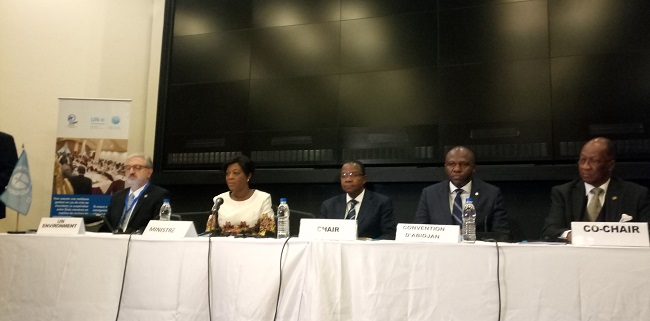“By signing these documents, you will make history as this is the first time ever that the three sub-regions of West, Central and Southern Africa will get together and agree on collective instruments to lay down the foundations for the sustainable management of marine and coastal resources and at the same time improve the livelihoods of coastal populations.

“By signing these instruments, you will confirm the end of the revitalisation process of the Abidjan Convention which had started some nine years ago and position the Convention in the centre of the current ocean debate in Africa.”
Those were the striking words of Abou Bamba, Executive Secretary of the Abidjan Convention at the organisation’s “Plenipotentiaries Meeting” holding from July 2 to 3, 2019 in Abidjan, Ivory Coast as he shed some light on significance of endorsing fresh protocols earlier adopted by Parties to the pact.
The new protocols relate to: Pollution from land-based sources and activities; Environmental norms and standards related to offshore oil and gas activities; Integrated coastal zone management; and Sustainable mangrove management.
Bamba expressed optimism that, after actualising the emergence of the protocols, the African coastal countries would play their full role and comply with rules and regulations that they have freely accepted, to move the continent one step ahead in terms of ocean governance.
He said: “It’s our sincere hope that the economic transformation of African countries, which is so needed, is prepared and organised by considering the Blue Economy principles which shall unlock the economic potential of African coastal nations. The long-term economic benefits of the sustainable management of marine resources have been proved all over the world. It’s time now that we make it happen in Africa.”
Executive Director of the United Nations Environment Programme (UNEP), Ms. Inger Anderssen, launded the initiative, saying that the four new protocols would definitively change the ocean governance in the continent.
Speaking on her behalf, the Coordinator, Global Programme of Action for the Protection of the Marine Environment from Land Based Activities (GPA), UN Environment, Dr Habib El-Habr, said: “The Integrated Coastal Zone Management protocol, when applied, will promote integrated planning and coordinated development of the coastal zone including insular belts and river basins and maintain the integrity of insular belts, coastlines, and river basins for the benefit of present and future generations.
“Mangroves are a rich source of biological diversity and natural resources that support livelihoods. They are a crucial component of many human activities such as fishing and aquaculture, renewable energy production, extraction of raw materials, and tourism.
“The mangroves protocol will harmonize principles and set modalities for managing mangrove ecosystems and establish rules for environmental protection and conservation of mangroves within the geographic scope of the Abidjan Convention. This is a major step ahead as none of the Regional Seas Conventions has ever developed such an instrument.
“The same protocol will also define the framework and modalities for stakeholder participation in the decision-making process for managing the mangrove ecosystems; and define modalities for the review and approval of projects, programmmes, and other initiatives for the use of the mangrove ecosystems.
“The oil and gas and LBSA protocols will also play an equally important role in the implementation of Sustainable Development Goal (SDG14) in the area of the Abidjan Convention. The United Nations Environment Programme is pleased to be associated to this major change in the ocean governance in West, Central and Southern Africa.
“Africa’s Atlantic coast is rich in natural resources, biodiversity and marine ecosystems – one of the richest and most productive in the world. For example, West Africa’s coastal zone is home to 105 million people out of the 367 million in the region and generates 56% of the region’s Gross Domestic Product (GDP). However, many natural and human factors such as pollution, climate change or population growth threaten an important number of fragile ecosystems. The objective of these protocols is to provide Member States with regional cooperation instruments aiming at improving the management of coastal zones and the marine environment.”
The UN body declared its “full” support for the protocols and their implementation, even as it reiterated its commitment to the Abidjan Convention and to its Secretariat.
